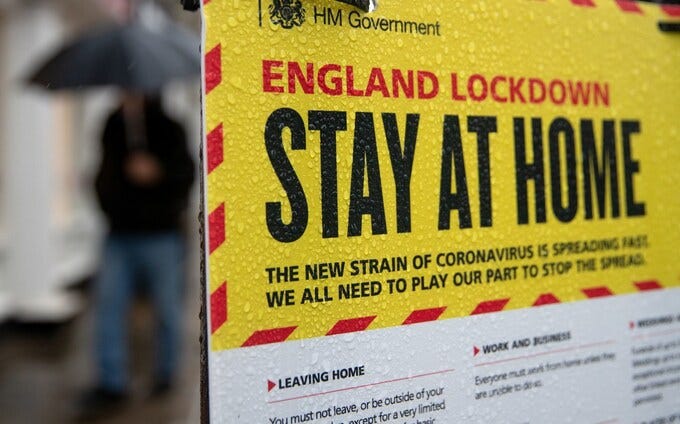Only cock-ups, thats all we seem interested in, cock-ups, not hard questions about what the 33 Horsemen of the COVID Apocalypse knew, did, participated in, not proper congressional hearings, just dog
dog & pony with photo op virtue signalling! COVID Inquiry in Britain proves it, & good money says Britain will be condemned to another Covid-style lockdown. The pathetic Whitehall Inquiry proves it
https://www.telegraph.co.uk/news/2023/11/04/britain-will-be-condemned-to-another-covid-style-lockdown/
Britain will be condemned to another Covid-style lockdown. This pathetic Inquiry proves it
Even as the ineptitude of Whitehall is being revealed in its full horror, the focus remains on childish tittle-tattle
DANIEL HANNAN4 November 2023 • 2:59pm
‘The Covid Inquiry opens a window into the unutterable uselessness of our state apparatus. I don’t just mean that we are learning about the cock-ups of 2020. I mean that the Inquiry itself, obsessed with gossip, apparently uninterested in hard questions and partial in its assumptions, demonstrates how badly our institutions work.
The one question that the country wants answered is whether closing shops and schools was justified. Mass confinement had not been countenanced in any of our contingency plans. Officials had war-gamed viral outbreaks with up to 750,000 fatalities – around three times as many as died in the event from Covid – without suggesting face masks, let alone the internment of the population.
Where did the idea of collective house arrest originate? From China, a state that habitually imprisons people without due process. “I think the Chinese lockdown is what gives the rest of the world the idea,” George Osborne told the Inquiry.
At the start of the first lockdown – a word derived from prison that I was at that stage reluctant to use – I wondered in these pages whether the global domino effect would have begun had the disease first broken out in a more liberal country. In December of 2020, Neil Ferguson, Professor Lockdown himself, admitted that “if China had not done it, the year would have been very different”.
But China’s authoritarianism did not, on its own, push our scientific advisers away from the plan that they had hammered out in cooler-headed times. At first, Britain held out against the global panic. On March 11 2020, Boris Johnson interviewed the then deputy chief medical officer, Jenny Harries, who calmly explained that, while people feeling ill should take themselves out of circulation, and while the elderly and vulnerable should stay home, there was no need to ban sporting events.
The PM pressed her on whether governments were being pushed to go beyond the science for the sake of being seen to act, and she replied, “as a professional, I am absolutely delighted that we are following the science and the evidence”.
That changed soon afterwards, whether because of Prof Ferguson’s bloodcurdling forecasts or, as Dominic Cummings claims, because of suggestions that the NHS couldn’t cope. Either way, Britain followed the rest of the world into lockdown, leaving only stolid, sceptical Sweden standing by the previous policy.
We necessarily imposed lockdown on the basis of provisional or hypothetical evidence. Now that we have hard data, that should surely be the chief focus of the Inquiry. How accurate did the models turn out to be? Did non-pharmaceutical interventions work? How many lives did they save? How many did they cost through missed medical procedures, the deleterious impact of being cooped up inside and, not least, the lower life-expectancy that tends to go with lower income?
We can now look at the overall death rates in countries that applied different levels of intervention. Australia, where lockdowns were severe, seems to have ended up with a higher excess mortality rate than Sweden, where restrictions were far lesser. Does that suggest that lockdowns killed more people than they saved? Surely it’s at least worth asking.
The one time the Government denied the modellers’ demand for a lockdown, it was vindicated. In December 2021, epidemiologists were predicting terrible consequences from the omicron variant that had emerged in South Africa. Sage was informed there could be as many as 6,000 deaths per day.
Johnson and Rishi Sunak consulted private-sector modelling, ignored the panic-mongers – and were vindicated. Far from being a deadly new wave, omicron helped immunise the population. All of which raises an awkward question. If the government was right to disregard scientific opinion when it wanted a fourth lockdown, might it have been right to ignore demands for the first, second and third lockdowns?
Baroness Hallett and her team seem to have instead started from the premise that lockdowns were the correct response, and that the only question is why they were not embraced earlier. Their questions are shot through with the assumption that the government was distracted by other matters, such as Brexit – even though the withdrawal deal had been concluded before anyone became aware of the domestic Covid threat.
The few witnesses who challenged the pro-lockdown consensus were disparaged or dismissed. Prof Carl Heneghan of Oxford came with a series of important questions, but ended up concluding that the presiding lawyers were more interested in Dominic Cummings’s bad language.
There is, indeed, an embarrassing smallness about the whole affair – especially the way it is covered by journalists. Ooh, allegations of a sexist culture at Number 10! Look, Matt Hancock posing with an imaginary cricket bat! Ha ha, Dominic Cummings using puerile swearwords! And, best of all, another chance to bash Boris!
In fact, Boris comes across as doing exactly the right thing, constantly testing the consensus and interrogating scientists. There are moments when being a journalist is excellent training to be a prime minister, and this was one of them. We see Boris asking all the right questions, sometimes in the eye-catching language that made him one of the best-read columnists in Fleet Street.
But, though his questions were searching, the PM ended up following official advice – as, in practice, he was bound to do. Sweden was lucky enough to have sceptical public health officials; Britain was not. Those who airily aver that Boris could have openly gone against both public opinion and the scientific consensus have no grasp of how democracies work.
The surprise is not that the officials were risk-averse. In February 2020, before any restrictions had been announced, I wrote about the over-reaction to previous health scares, such as bird and swine flu, and observed that, in our system, all the incentives were skewed:
“Almost every minister would rather be accused of over-reacting to a threat than of having done too little. There is a similar bias, albeit a less pronounced one, among the various medical advisory bodies: epidemics are what they exist for, and they wouldn’t be human if they didn’t have a subliminal desire to talk them up.”
No, the real shock is not the over-reaction, but the ineptness. Cummings told the hearings that the PM used to complain that, instead of being at the wheel of a Rolls-Royce civil service, he was like Clouseau in that van that falls to pieces as he drives, the gearstick coming off in his hands. Who, reading the rest of Cummings’s testimony – who, come to that, recalling the disastrous failures over kit and testing – can doubt the aptness of Boris’s metaphor?
It is often said that this Inquiry is a wasted opportunity, because we need to learn lessons for a future pandemic. In reality, though, the evidence of 2020 is that, whatever protocols you have in place, they will be junked by safety-obsessed civil servants and panicky advisers.
More depressing is what the whole process teaches us about how Whitehall works. In a crisis, the bureaucracy’s first instinct is to centralise, regulate and ban – and then defend its stance regardless of changed circumstances.
“The question of how to avoid lockdown was never asked of us and I find that extraordinary,” said Prof Mark Woolhouse of Edinburgh, one of a handful of dissenting voices at the Inquiry. Quite. And now it seems it never will be. What a wasted opportunity.’






We have all been trapped within a giant beaurocratic machine which runs our lives and ensures none of the 'operators' can be made responsible for anything so no blame is ever apportioned appropriately and the controlling hands are hidden behind the entire mechanism. At least that is how it seems to me.
"No Minister, I beg you,” replies Sir Humphrey. “A basic rule of government is never look into anything you don’t have to, and never set up an inquiry unless you know in advance what its findings will be."
This quote from the popular former long running British televsion series "Yes Minister" conveys exactly what is going on with Baroness Heather Hallett's travesty of a whitewash inquiry. The outcome has been predetermined. It will exonerate the covid vaccines of causing any harm, if it even mentions the vaccines at all in its final report. It will conclude that lockdowns and masks are the best thing since sliced bread. Allies of Rishi Sunak will come out smelling of roses. Former PM Bozo the clown will likely be thrown under the bus. None of this will save the Conservative Party which will suffer a crushing defeat at the hands of Labour Opposition Leader Sir Keir Starmer's Socialists at the next British general election. Nobody will vote for them. They will vote against the Conservatives and Labour will be elected by default. Labour are the party of former PM Sir Tony Bliar and will suck up to Biden even harder than Bliar sucked up to GW Bush. British Labour loves vaccines, lockdowns and masks even more than the British Conservatives do, as hard as that may be for some to believe. Vaccines, masks and lockdowns are in their political DNA.